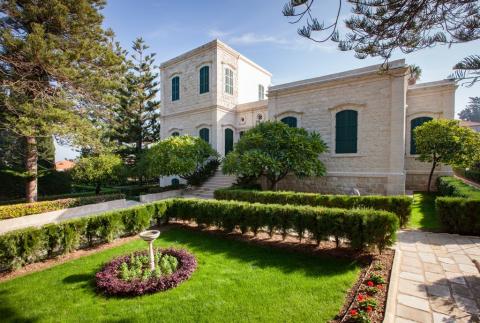Khalil Gibran was a celebrated Lebanese poet and painter who happened to live across the street from Juliet Thompson, who knew him quite well. He worked on an Arab newspaper which left him free to paint and write. He showed Juliet almost all his books while they were still in manuscript. Gibran told her that he was thinking of ‘Abdu’l- Bahá when he wrote the Son of Man and that he was going to write another book with ‘Abdu’l- Bahá at the center. Gibran learned about the Faith when someone gave him Some Writings of Bahá’u’lláh in Arabic. When Juliet told him that the Master was coming, he asked if she would ask the Master if he would allow him to sketch him. The Master gave him one hour, starting at 6:30 in the morning. Juliet said "He made an outstanding head. It doesn't look like the Master very faint likeness. Great power to the shoulders. A great radiance in the face." Gibran adored the Master would go to Juliet's flat often to see Him. After the Master left he spent his time writing books. He talked about the Master often, but he couldn't accept ‘Abdu’l- Bahá station. Years later Gibran went to a Bahá’í Center when the Master's motion picture was going to be shown. When he saw the Master on the screen, he began to cry. Juliet wrote that "He had been asked to speak and when his turn came, he jumped onto the platform with his face covered in tears and said: I declare, that ‘Abdu’l- Bahá is the Manifestation of God for this day!" He was strongly affected by ‘Abdu’l- Bahá, even though he didn't understand the Master's station.
Khalil Gibran
Earl Redman, ‘Abdu’l-Bahá in Their Midst, p. 75
On one of His visits to New York He stayed with Juliet Thompson on West 10th Street not far from Fifth Avenue. Two or three doors away and across the street, the poet Khalil Gibran was staying with friends. He and ‘Abdu’l-Bahá had met in Syria so now they met again. Gibran said that he believed in everything Bahá’u’lláh had taught, but that he would never declare himself as a Bahá’í because he had his own message to give to mankind and he wished this to remain clearly his. However, said Gibran, he would like to do something for ‘Abdu’l-Bahá - so what might he do? "‘Abdu’l-Bahá was pleased and said, very good - go write me a book and the famous Jesus, Son of Man by Khalil Gibran's was that book.
Reginald Grant Barrow, Mother's Stories: Stories of ‘Abdu’l-Bahá and Early Believers told by Muriel Ives Barrow Newhall to her son, p. 40
